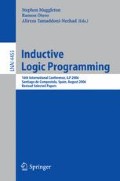Abstract
Learning sets of first-order rules has a long tradition in machine learning and inductive logic programming. While most traditional systems follow a separate-and-conquer approach, many modern systems are based on statistical considerations, such as ensemble theory, large margin classification or graphical models. In this work, we frame relational learning as a statistical classification problem and apply tools and concepts from statistical learning theory to design a new statistical first-order rule learning system. The system’s design is motivated by the goal of finding theoretically well-founded answers to some of the greatest challenges faced by first-order learning systems. First, using strict binary-valued logic as a representation language is known to be suboptimal for noisy, imprecise or uncertain data and background knowledge as frequently encountered in practice. As in many other state-of-the-art rule learning approaches [1], we therefore assign weights to the rules. In this way, a rule set represents a linear classifier and one can optimize margin-based optimization criteria, essentially reducing the misclassification error on noisy data. Since we aim at comprehensible models, we employ margins without the kernel trick. Second, the problem of finding a hypothesis that explains the training set is known to be NP-hard even for the simplest possible classifiers, from propositional monomials to linear classifiers. To avoid the computational complexity of optimizing the empirical training error directly, we use a feasible margin-based relaxation, margin minus variance (MMV), as introduced recently for propositional domains [2]. MMV minimization is linear in the number of instances and therefore well-suited for large datasets. Third, in multi-relational learning settings, one can formulate almost arbitrarily complex queries or clauses, to describe a training or test instance. Thus, there is a potentially unlimited number of features that can be used for classification and overfitting avoidance should be of great importance. We derived an error bound based on MMV, giving us a theoretically sound stopping criterion controlling the number of rules in a weighted rule set. The rule generation process is based on traditional first-order rule refinement and declarative language bias. It is possible to choose from a variety of search strategies, from a predefined order of clauses to rearranging the order based on the weights attached to clauses in the model so far. The system is implemented as a stand-alone tool integrating a Prolog engine.
Access this chapter
Tax calculation will be finalised at checkout
Purchases are for personal use only
References
Friedman, J., Bogdan, E.: Popescu. Predictive learning via rule ensembles. Technical report, Stanford University (2005)
Rückert, U., Kramer, S.: A statistical approach to rule learning. In: Machine Learning. Proceedings of the 23rd International Conf., ACM Press, New York (2006)
Author information
Authors and Affiliations
Editor information
Rights and permissions
Copyright information
© 2007 Springer-Verlag Berlin Heidelberg
About this paper
Cite this paper
Rückert, U., Kramer, S. (2007). Margin-Based First-Order Rule Learning. In: Muggleton, S., Otero, R., Tamaddoni-Nezhad, A. (eds) Inductive Logic Programming. ILP 2006. Lecture Notes in Computer Science(), vol 4455. Springer, Berlin, Heidelberg. https://doi.org/10.1007/978-3-540-73847-3_12
Download citation
DOI: https://doi.org/10.1007/978-3-540-73847-3_12
Publisher Name: Springer, Berlin, Heidelberg
Print ISBN: 978-3-540-73846-6
Online ISBN: 978-3-540-73847-3
eBook Packages: Computer ScienceComputer Science (R0)

